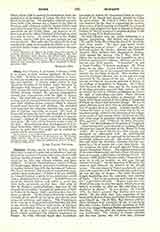

Olivaint, PIERRE, was b. in Paris, February 22, 1816. His father, a man of repute, but an unbeliever and imbittered by reverses of fortune and career, died in 1835 without having returned to the faith. He was survived by his wife, also without religion, and three children. At twenty Pierre left home, and the College of Charlemagne, where he had made a brilliant course of studies, imbued him with the doctrines of Voltaire. His heart, however, had remained remarkably pure, and he writes at this time: “I desire, if by any possibility I should become a priest, to be a missionary, and if I am a missionary to be a martyr.” In 1836 Pierre entered the Normal School, and, where so many lose their faith, conversion awaited him. Led away at first by Buchez’s neo-Catholicism, then won by the sermons of Lacordaire, he made his profession of faith to Father de Ravignan (1837), and from that time became an apostle. At the Normal School he formed a Catholic group which by its piety and charity soon attracted attention and respect. The Conferences of St. Vincent de Paul attracted at that time the elite of the schools, and Olivaint with twelve of his companions established them in the parish of Saint Medard. By the ardor of their charity and faith these heroic youths symbolized the religious renaissance in France. In 1836, Olivaint heard that Lacordairewas going to restore the Dominican Order in France. Several of his friends had already decided to follow the great orator. He wished to follow him also, but was detained by the duty of supporting his mother. After a year of professorship at Grenoble, he returned to Paris, and occupied the chair of history at Bourbon College; in 1841 he accepted a position as tutor to the young George de la Rochefoucaud.
In 1842 Olivaint won the junior fellowship in a history competition. His lecture was on Gregory VII, and M. Saint-Marc Girardin closed the Assembly with these words: “We have just heard virtue, pleading the cause of virtue”. At this time war was declared against the Jesuits. Quinet and Michelet changed their lectures into impassioned declarations against the society. On May 2, 1845, M. Thiers was to conduct before the Assembly an interpellation against these religious. Olivaint saw that it was his duty to be present. “I hesitated”, he said to Louis Veuillot, “I hesitate no longer. M. Thiers shows me my duty. I must follow it. I enter today.” And the day of the proposed interpellation he entered the novitiate of Laval. This sacrifice was hard for Madame Olivaint who as yet had not been converted by the virtues of her son. After a year’s fervent novitiate he was made professor of history at the College of Brugelette; in Belgium. On May 3, 1847, he made his first vows, and on the completion of theological studies received Holy orders. In the meanwhile the Law of 1850 had established, in France, the right of controlling education. Pierre Olivaint was summoned to Paris, where he remained. On April 3, 1852, Pierre arrived at the College of Vaugirard of which the Jesuits had accepted charge. He was to spend thirteen years here, first as professor and prefect of studies, then as rector. A model teacher, he trained the heart as well as the mind, and by his exhaustless energy, added to the direction of his college, many works of zeal, among others “L’Euvre de l’Enfant Jesus pour la premiere communion des jeunes filles pauvres”, and “L’Oeuvre de Saint Francois-Xavier”, for the workmen of the parish of Vaugirard.
After twenty-five years devoted to teaching, Father Olivaint was named Superior of the House in Paris (1865). He accepted this burden with courage, and displayed an unbounded zeal. An indefatigable preacher and director, he exercised by his sanctity an irresistible influence over all. His mother yielded to him and under his direction, Madame Olivaint prepared by a life of prayer for a very holy death. In the meantime the spirit of revolt agitated Paris, and spread throughout France. The religious renaissance of the nineteenth century, in which Pierre Olivaint had been an example, called forth a retaliation of evil. In January, 1870, Father Olivaint wrote “Persecution is upon us; it will be terrible: we will pass through torrents of blood.” On the desertion of Rome by the emperor had followed the disaster of the French troops. The investment of Paris was planned, and to those who urged him to fly Father Olivaint replied that his was the post of danger. The most formidable danger impending was the commune, now mistress of Paris. “Let us be generous and ready for sacrifice”, said Father Olivaint. “France must have the blood of the pure to raise her again; which one of us, indeed, is worthy to offer his life, and what a joy should we be chosen.” He was chosen. On April 4, 1871, the federes arrested Msgr. Darboy and several others. On the fifth, they took possession of the house on the Rue de Sevres and Father Olivaint quietly gave himself up. On May 24, Msgr. Darboy and five other prisoners were executed; on the twenty-sixth, fifty-two victims, Father Olivaint marching at their head, were dragged through Paris and massacred in the Rue Haxo. The day after this expiation the commune was overthrown. The remains of Father Olivaint and the four priests who fell with him (Fathers Ducoudray, Caubert, Clerc, et de Bengy) were placed in a chapel in the Rue de Sevres, where the pious faithful still continue to invoke them, and numberless graces have been attributed to their intercession.
PIERRE SUAU

